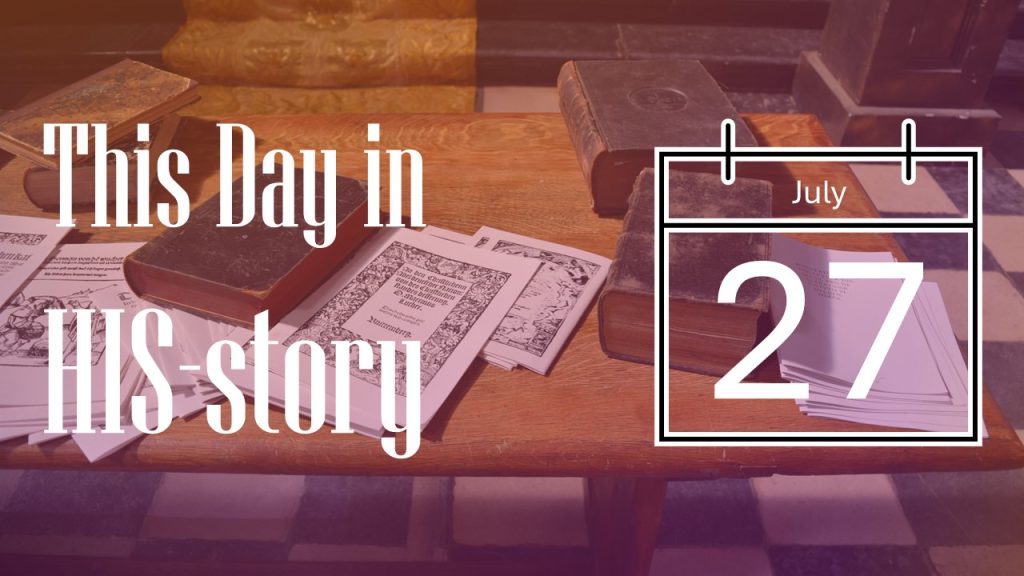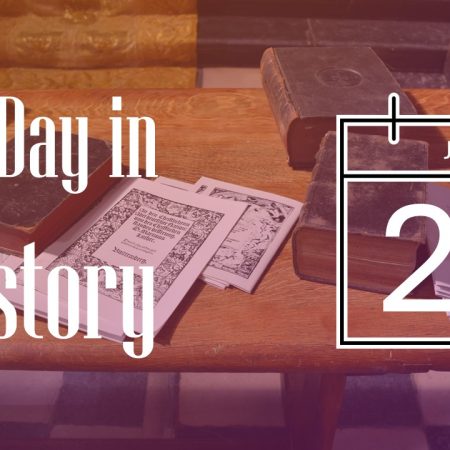
1620
HT: Christian History Institute
Many of the Pilgrims who ventured on the Mayflower had lived for several years as refugees in the Netherlands. They embarked on the Speedwell at Delftshaven in July 1620, leaving the majority of their company behind with pastor John Robinson.

John Robinson memorial plaque in Leyden
The plan was for the first group to return to England, engage ships, sail to the new world and start a settlement. The remainder of the company would follow in a later voyage. Robinson wrote a letter to their leader, John Carver, “in which the tender love and godly care of a true pastor appears,” to quote William Bradford. The letter was dated this day 27 July, 1620. The spelling has been modernized.
My dear Brother, I received enclosed in your last letter the note of information, which I shall carefully keep and make use of as there shall be occasion. I have a true feeling of your perplexity of mind and toil of body, but I hope that you who have always been able so plentifully to administer comfort unto others in their trials, are so well furnished for your self as that far greater difficulties than you have yet undergone (though I conceive them to have been great enough) cannot oppress you, though they press you, as the Apostle speaks. The spirit of a man (sustained by the Spirit of God) will sustain his infirmity, I doubt not so will yours. And the better much when you shall enjoy the presence and help of so many godly and wise brethren, for the bearing of part of your burden, who also will not admit into their hearts the least thought of suspicion of any the least negligence, at least presumption, to have been in you, whatsoever they think in others. Now what shall I say or write unto you and your goodwife my loving sister? Even only this, I desire (and always shall) unto you from the Lord, as unto my own soul; and assure your self that my heart is with you, and that I will not foreslow [delay] my bodily coming at the first opportunity. I have written a large letter to the whole [group], and am sorry I shall not rather speak then write to them; and the more, considering the want of a preacher, which I shall also make some spur to my hastening after you. I do ever commend my best affection unto you, which if I thought you made any doubt of, I would express in more, and the same more ample and full words. And the Lord in whom you trust and whom you serve ever in this business and journey, guide you with his hand, protect you with his wing, and show you and us his salvation in the end, and bring us in the mean while together in the place desired, if such be his good will, for his Christ’s sake. Amen.
Bradford, William. History of Plimoth Plantation. Boston: Wright & Potter Printing Co., 1898.
Yours, &c. Jo: R.
1681
Death to the believer is just like putting off a worn suit of clothes, and putting on a new suit.” Those were the words of Donald Cargill. On this day, July 27, 1681, he put on his new suit.

A scottish preacher, he suffered persecution when he refused to accept the episcopal form of church government (bishop run churches) that London tried to impose on Scotland. Scotland was Presbyterian (elder run). Thousands in Scotland signed their names to covenants in which they promised to uphold the faith of their fathers. Some fought for it. Donald took part in the disorganized Battle at Bothwell Bridge at which the king’s forces defeated the Scottish rebels, but, although wounded, he escaped.
In a famous sermon, he “excommunicated” King Charles II and his counselors, saying, “The Church ought to declare that those who are none of Christ’s are none of hers.”
Such actions marked him as a wanted man. Several times he was almost captured. One such instance took place at Queensferry. An agent of the king, praised Donald and expressed a desire to meet with him to drink to his health. When Donald appeared, the agent pretended friendship but then arrested Donald and Henry Hall. The men struggled to escape. Hall was mortally wounded. Donald also was wounded, but got away. Despite his injuries, he preached the following Sunday.
Wandering in exile, he often preached openly in the Scottish lowlands, but at other times, he was forced to stay hidden. Highland clansmen hunted for Donald and other Covenanters, because they had been promised bounties for the capture of such “rebels.”
The law caught up with Donald at Lanarkshire in May 1681. He was cruelly treated and hauled to jail with his feet tied tightly under a horse’s belly. Convicted of high treason in Edinburgh, he was condemned to be hanged and beheaded.
In one of his sermons, Donald had said, “If believers loved Christ as He loves them, they would be more in haste to meet Him.” That spirit caused him to die bravely. As he mounted the ladder to be hanged, he said, “The Lord knows, I go up this ladder in less fear and perturbed of mind that ever I entered the pulpit to preach… Farewell, all relations and friends in Christ; farewell all acquaintances and all earthly enjoyments; farewell reading and preaching, praying and believing, wanderings, reproaches and sufferings. Welcome joy unspeakable and full of glory. Welcome Father, Son and Holy Ghost. Into thy hands I commit my spirit.”
To the Covenanters, Donald was a martyr for the faith that many Scots had vowed to uphold. But to those Scots who had accommodated the reigning powers, he seemed a radical and a traitor.
1749
Konkapot, chief of the Mahicans of Massachusetts, came to a hard decision. Since he could not hope to defeat the white invaders who were pressing on his lands, he would join them. His tribe would become Christians. In 1734, he asked for missionaries.
After negotiations, the Puritans responded by sending John Sergeant. John took a deep interest in the fortunes of this declining tribe who needed much more than spiritual assistance. One of his first efforts was to open a school for their children. When he returned east to complete his own education, he took two Mahicans with him to further theirs.

Then the Yale graduate returned to work among the Indians. At that time they lived as two bands many miles apart. He and his assistant Timothy Woodbridge were exhausted traveling between them. He suggested the two groups unite in a central location. In this way they founded Stockbridge, Massachusetts and he built the first house there.
The Massachusetts colonial government funded a school and a meeting house. Although the missionaries lived separate from the Indians, the town government did become integrated, with Indians and whites sharing power. Using English methods, the Indians harvested bumper crops. Interested Englishmen contributed funds for the success of the experiment.
However, unscrupulous whites began to seize land that was promised to the Indians in perpetuity. Among them was John’s father-in-law. He had married Abigail Williams, daughter of the Rev. Ephraim Williams. Ephraim did much harm to the Mahicans.
John died on this day, July 27, 1749. With his passing, the Indians lost their champion and the terms of their settlement were increasingly violated. A general who was appointed to manage the town married John’s widow and sold liquor to the Indians.
John is little remembered today. However, his legacy of concern for the Indians lived on when Jonathan Edwards took over the mission post for a few years.
But John’s legacy found its most ardent expression in the young man who hoped to become the son-in-law of Jonathan Edwards. Many have heard of David Brainerd, the missionary to American Indians who died young but bequeathed a spiritual journal to posterity that has inspired dedication in countless later Christians. His inauguration as a missionary was owing to John Sergeant. John had visited Indians along the Delaware River and asked the Scottish Society for Propagating Christian Knowledge (SSPCK) to send them a missionary. Brainerd was the result.
1926
William Sangster is ordained in Wesley Chapel. He will become one of the most influential leaders of the British Methodists during the twentieth century and will constantly appeal to Methodists to return to their roots and seek deeper faith. He also will resist anti-Semitism.
